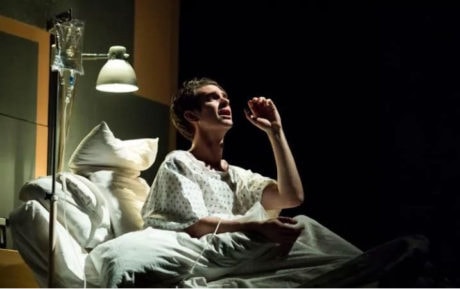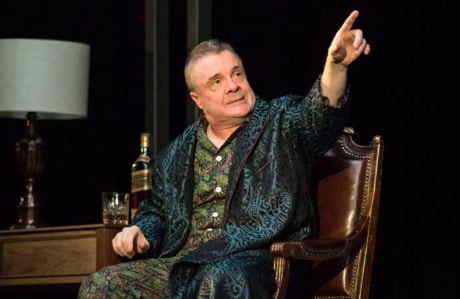Angels in America remains a sad, hilarious, hallucinogenic theatrical achievement. The juxtaposition of those seemingly-opposite qualities is what makes the play memorable.
It has even greater impact than before, more than a quarter of a century ago. Its virtues are different from those we admired previously, which became apparent when the new production by the National Theatre in London was streamed to cinemas in HD.

Back in the 1990s, Angels in America came across as a polemic by gay men who were frightened by the death sentence of AIDS. Now that sexual differences are more accepted, and many people live with AIDS for years, we look for broader subject matter, and Tony Kushner’s script supplies it. Kushner’s play in two parts (a total of six acts) is certainly long, but it’s worth taking time to savor his colloquies and ruminations about politics, religion, loyalty, guilt, and the failure to live up to expectations.
The outstanding revelations in this production are the acting of Andrew Garfield (the title character in the film The Amazing Spider-Man) playing Prior Walter, who has just revealed that he has AIDS, flamboyantly intense with fluttering hands to indicate his panic; and Nathan Lane playing the real-life attorney Roy Cohn, a closeted gay man who died of AIDS while insisting he didn’t have it. Lane gives the ruthless Cohn a tad more humanity than others have shown. The arrogant real Cohn didn’t deserve that softening of tone, but Lane’s interpretation reveals subtleties that make the story more interesting.
Another asset is the Irish actress Denise Gough playing the valium-addicted Harper Pitt with more strength than previous interpreters. Also excellent are James McArdle as the talkative Louis Ironson who is wracked with guilt about leaving his lover when his presence was most needed, and the droll Nathan Stewart-Jarrett as a drag queen nurse, a black man who is a target for Cohn’s vicious prejudices.
The one major character whom I have not mentioned is Joe Pitt — married, a closeted gay, Mormon attorney whom Roy Cohn recruits to be his henchman inside the Justice Department. His long-denied sexuality is the cause for his wife’s terrors and addictions. Russell Tovey plays Joe as if he’s reading lines rather than being a flesh-and-blood person.

The director of this production is Marianne Elliott. Considering the visual innovations of her stagings of War Horse and The Curious Incident of the Dog in the Night-Time, it’s a disappointment to see her rather ordinary interpretation. Action is set in cubicles outlined with neon tubes (designed by Ian MacNeil) and they move back and forth, apparently to illustrate the connections between characters. The arrival of an angel from above is less impressive here than other productions we’ve seen.
Some critics think the script is too verbose, but I revel in Kushner’s poetic digressions and contemplations. I do find the double casting of certain roles to be disconcerting, even though this also was done in the original production. A female actress plays a rabbi (who, in that time, would unlikely be female) and Cohn’s doctor Henry (whom Cohn would never allow to be female), and a Justice Department attorney named Martin, whose character is absurd when it is feminized. Kushner no doubt wanted to spotlight the errors of gender expectations and gender stereotyping, but it confuses the play. Also, the two actresses who played Joe’s mother and her real-estate agent, from Utah, had terribly inauthentic accents.
With its examination of intolerance and religious hypocrisy, Angels in America is still pertinent. In one of many parallels to our time, Cohn’s crony exults that “It’s really the end of liberalism. The end of New Deal socialism. The end of ipso facto secular humanism. The dawning of a genuinely American political personality.”
I write this after seeing the first half, Angels in America: Millennium Approaches. We look forward to the second half of this story which will be telecast live from London on Thursday, July 27.
Running time: Three hours and 40 minutes, including two intermissions.
Angels in America: A Gay Fantasia on National Themes plays through August 19, 2017, at the National Theatre, London. The first part, Angels in America: Millennium Approaches, was presented by Fathom Events live in HD at selected cinemas on July 20, 2017. Part two, Angels in America: Perestroika, will be shown live in cinemas on July 27, 2017. Encores will be announced for selected locations. Tickets to the HD screenings can be ordered online.





This is a fascinating review. Thank you, Steve Cohen, for telling it as it is!